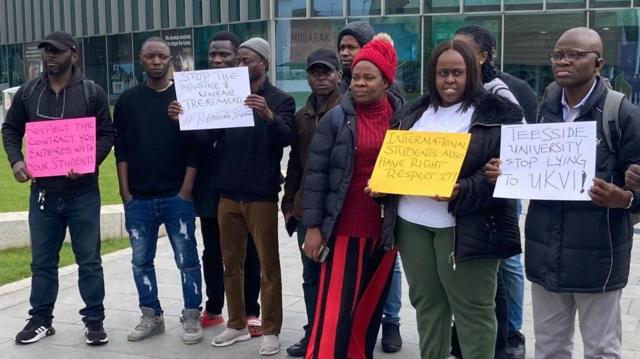The Federal Government has come to the rescue of several Nigerian students at Teesside University in the United Kingdom following the controversial deportation orders issued to several of them.
Ambassador Christian Okeke, the representative of the Nigerian Embassy in the UK, will lead a delegation comprising leaders of the Nigerian Students Union in the UK. They are scheduled to meet with the university’s management to find a resolution.
The resolution was made after an online meeting overseen by the Chairman/CEO of the Nigerians in Diaspora Commission, Abike Dabiri-Erewa, and with the presence of Ambassador Okeke, the President of the Nigerian Students Union in the UK, Yemi Soile, and numerous impacted students. The virtual gathering took place over the weekend.
The NIDCOM spokesperson, Abdur-Rahman Balogun, disclosed the development in a statement on Wednesday, May 29, 2024.
According to Balogun, during the meeting, the students stated their challenges and expressed hope for a favorable outcome.
Dabiri-Erewa urged the students “to remain calm and not to take the law into their own hands”.
She appealed to Teesside University to treat the students fairly and justly.
Backstory
The issue gained attention after some Nigerian students at Teesside University staged a protest on Wednesday, May 22, 2024.
The demonstration occurred as a reaction to the university administration’s instructions to expel students from the United Kingdom due to unpaid tuition fees by certain students.
According to the BBC, the students mentioned the devaluation of the naira as a major hindrance in fulfilling their financial responsibilities, resulting in a violation of their visa sponsorship requirements.
Several students were unable to access their university accounts, reported to the Home Office, and instructed to depart from the UK. The university asserted that stringent external regulations compel these measures.
The affected students, numbering 60, expressed deep distress and disappointment, accusing the university of being unsupportive and “heartless.”
After observing their fellow students suffer severe repercussions due to late payments, they united to implore the university for help.
One student, Adenike Ibrahim, was on the verge of graduating when her visa was revoked, despite having paid 90% of her tuition fees. “I did default [on payments], but I’d already paid 90% of my tuition fees and attended all my classes,” Ibrahim told the BBC.
She added that attempts to reach an agreement with the university were futile, leaving her and her son in distress.
Another student, Esther Obigwe, shared that the ordeal has led to depression. She repeatedly sought help from the university regarding her financial struggles but was ignored until her studies were blocked, and she was notified to leave the country.
“I attended all of my classes and seminars. It is disheartening; I am now on antidepressants and have nobody to talk to,” Obigwe said.
A social work student, Jude Salubi, was in the middle of a critical placement when he was informed that his access to the university was suspended, and he had to leave the UK.
Despite having paid £14,000, he still owed another £14,000. “I am willing to agree on how to pay this, but I need guarantees that I will be re-enrolled and my visa restored,” Salubi stated.
Teesside University’s representative highlighted the institution’s dedication to its diverse student population while stressing the importance of complying with stringent visa regulations. It was mentioned that the university has implemented tailored payment options for students facing financial challenges; however, there have been cases of non-payment.
The Home Office specified that the responsibility of granting or revoking visa sponsorship rests with the sponsoring organization. Those individuals whose visas have been curtailed or revoked are encouraged to either legalize their status or make arrangements to leave the United Kingdom.










